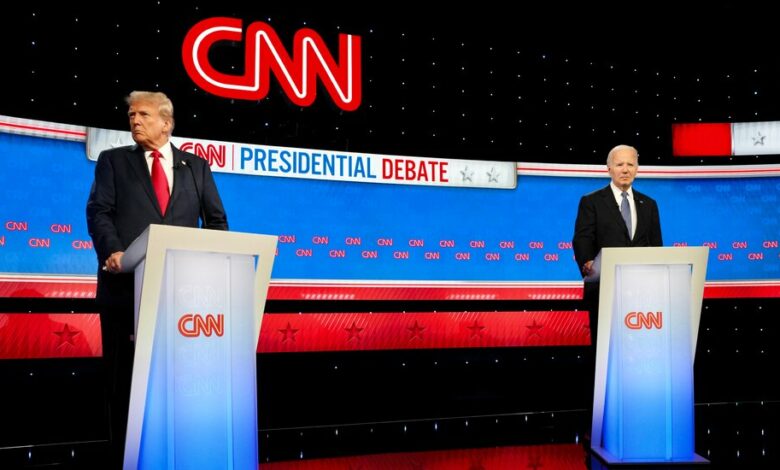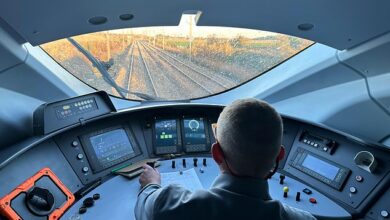In the debate, Trump shrugs his shoulders and it is NATO that is shocked

While President Biden performed poorly during the presidential debate on Thursday evening, former President Donald J. Trump caused unrest among America’s allies with a simple shrug.
Mr Trump has regularly disparaged NATO and even threatened to withdraw the United States from it, and during the debate he did nothing to assuage European concerns about his antipathy toward the military alliance.
When Biden asked him whether he would withdraw from NATO, Trump did not answer, but shrugged.
“I was very worried before this debate and I am even more worried now,” said Jana Puglierin, director of the German office of the European Council on Foreign Relations. “Trump may or may not want to officially leave NATO, but he has all the means to undermine NATO.”
At the heart of NATO is Article Five of the charter, which obligates each member country to defend all others. “Deterrence is about credibility, and deep down, Article Five has always been what you make it,” Ms. Puglierin said. “So it depends on whether the American president makes it a credible threat.”
Given Mr Trump’s scepticism about alliances, European countries that rely on the promise of American protection, she said, fear that he could try to establish bilateral relations with Europe “and make them transactional”.
Camille Grand, a former assistant secretary general of NATO, said that in a second term, Trump would be surrounded by people “who want to translate his instincts into policy instead of saying, ‘This is a bad idea, Mr. President. ”
“But the worst thing is its unpredictability, and Europe is at war,” he added. In peacetime there is always another summit or an opportunity to build relationships, he said. “But if in a war he suddenly proposes a peace settlement or something that makes the American security guarantee hollow, that’s much harder to deal with,” Mr. Grand said.
Mr. Trump boasted Thursday evening that he had forced European countries to increase their military spending, even though it had been under Mr. Biden have increased even more. Mr. Grand said Europeans already understand they need to do more for their own defense, and in fact they are spending $130 billion more every year than in 2014, he said.
But whoever the president is, “we have to make sure we can defend Europe with less America.”
NATO supporters weren’t the only international observers unnerved by the debate. The back-and-forth between a blustering Mr. Trump and a wavering Mr. Biden had analysts worried — and not just about who might win the November election.
Sergey Radchenko, a historian at the Johns Hopkins School of Advanced International Studies in Washington, wrote on X“This election does more to discredit American democracy than Vladimir Putin and Xi Jinping could ever hope,” referring to the leaders of Russia and China, America’s most powerful rivals.
“I am concerned about the image that is being projected to the outside world,” he continued. “It is not an image of leadership. It is an image of terminal decline.”
Whoever becomes president, the United States faces daunting global challenges — in Asia, from a rising China and a nuclear North Korea recently bolstered by Mr. Putin; in Europe, from Russia’s war on Ukraine; and in the Middle East, where Israel’s war on Hamas threatens to spread to southern Lebanon and even Iran.
There was little substantive foreign policy in the noisy debate. Mr. Trump continued to insist without explanation that he could have prevented Mr. Putin invaded Ukraine, or Hamas invaded Israel, and that he could have quickly ended both conflicts.
Mr Biden cited his efforts to bring allies together to help Ukraine and confront Russia. “I have 50 other countries around the world that are supporting Ukraine, including Japan and South Korea,” he said.
For some, the debate made a Trump presidency, already considered a strong possibility, seem like a likelihood, said François Heisbourg, a French analyst. “So on all issues, the debate is a confirmation of European concerns, and some of it is already integrated into people’s thinking.”
“People are hearing Trump say he wants to cut aid to Ukraine, so this is going to be at the center of the debate,” he said, along with Trump’s stated preference for Putin as a strong leader.
On Israel and Gaza, however, “I’m not sure it will make much difference,” Mr. Heisbourg said. “You cannot move the embassy to Jerusalem twice.”
In addition to existing concerns about the unpredictable Mr. Trump, which the debate only confirmed, there are also new concerns about Mr. Biden’s ability to govern. One of the harshest assessments came from Radoslaw Sikorski, Poland’s foreign minister. In a post on social media he said: compared Mr. Biden to Marcus Aureliusthe Roman emperor who “bungled his succession by passing the baton to his reckless son Commodus, whose disastrous reign heralded the downfall of Rome.”
“It is important to manage the ride into the sunset,” Mr. Sikorski added.
In Ukraine, the commotion about the debate resounded on Friday.
Referring to Mr. Biden, Bogdan Butkevycha popular radio host, wrote on social media: “His main task was to convince voters of his energy and willingness to govern.” But he added: “He couldn’t do it. Accordingly, the chances of his replacement by another Democratic candidate increase.”
Some took some comfort in Trump’s statement that he did not find it acceptable for the Kremlin to maintain occupied territories. The Kiev Independent, a Ukrainian news channel, published a headline that read: “Trump rejects Putin’s peace terms as Biden unnerves Democrats.”
Russian media portrayed the debate as a sign of American weakness and disarray. The result “is good for us,” Dmitry Novikov, a Russian lawmaker, said on a talk show on state television on Friday. “Destabilization within an opponent is always a good thing.”
In Asia, the debate has raised serious questions about how U.S. policy might affect stability. Trump’s term has deeply shaken alliances in the region, and countries that hoped the United States would balance China’s influence and undermine North Korea’s nuclear ambitions have spent the past four years trying to repair ties with Washington.
“It was clearly a Trump victory and a nail in the coffin of Biden’s campaign,” said Lee Byong-chul, a professor at the Institute for Far Eastern Studies at Kyungnam University in Seoul.
“We must now brace for a second Trump administration,” he added.
In Japan, a key U.S. ally in Asia, officials have almost always been zealous in declaring their willingness to work with whomever the United States chooses. But Trump’s comments during the debate that he does not want to spend money defending allies are likely to revive fears that he sees international relations as transactional rather than sustainable.
“I suspect that Japanese policymakers are thinking, ‘Okay, it’s very likely to be Trump, so we need to strengthen the institutional ties as much as possible so that he can’t undo them,’” said Koichi Nakano, a political scientist at Sophia University in Tokyo. “That’s like tying yourself to a mast that might sink soon, so it’s a false illusion of security.”
India has worked in recent years to overcome a long history of mistrust by expanding military and trade ties with Washington. While Prime Minister Narendra Modi maintained warm relations with Trump during his presidency, the Indian establishment has seen in Biden a steady hand that understands how alliances work and how to contain geopolitical risks.
Dr. Tara Kartha, a former senior official at India’s National Security Council, noted that Trump is unpredictable and could change his stance — such as changing his current hardline stance on China if Beijing offers him better trade terms. That uncertainty makes calculations difficult for India, which shares a border with China and a long rivalry with Beijing.
“We are now hedging with China,” she said. “Because you’re not really sure what’s going to happen to the US.”
In China, the presidential debate was a top trending topic on the social media platform Weibo. Official Chinese media outlets largely played it straight, reporting each candidate’s comments — and their lack of a handshake — without adding much commentary.
Shen Dingli, a Shanghai-based international relations scholar, said the debate has reinforced something the Chinese government has long thought: No matter who the next president is, U.S. policy toward China is likely to only harden.
What became clear after Thursday’s debate was that few Asian analysts were optimistic about US election options.
“Where are the good? Where are the brave?” said Kasit Piromya, who has served as foreign minister and ambassador to Thailand for Thailand. He added that countries in Southeast Asia should have their own views on foreign policy.
“Why should I wait until Trump is bad?” he said.
The reporting was provided by Damien Cave, Sui Lee Wee, Choe Sang-Hun, Vivian Wang, Camille Elemia, Mujib Mashal, Segolene Le Stradic, Marc Santora And Oleg Matsnev.




